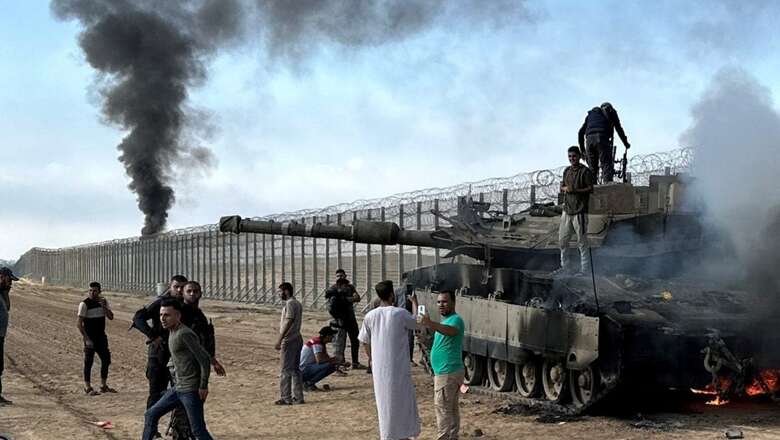
views
In this article, I will attempt to find out who benefits from the recent attack on the sovereign state of Israel. Since former US President Jimmy Carter brokered a peace agreement titled ‘Framework for Peace in the Middle East’, known as the Camp David Accord, signed between Egypt and Israel on September 17, 1978, and which led to the signing of a peace treaty between the two countries, Israel has been working studiously to broaden the scope of achieving regional peace by diplomatic means.
On October 26, 1993, Israel managed to get Jordan to sign the ‘Jordan-Israel Peace Treaty’ thereby extending peace to a second neighbouring country. However, Israel had to wait until 2020 before it could convince another Arab country to join its endeavour to establish peace in the region. This time it was the Persian Gulf nation of the United Arab Emirates (UAE). Peace with the UAE was a landmark achievement. It is known as the ‘Abraham Accord’. This accord furthered the cause of peace, established diplomatic ties and full normalisation of relations between the UAE and Israel.
Bahrain joined the UAE in signing the peace deal as well, which then led to the normalisation of relations between Morocco and Israel, formally establishing diplomatic relations between the two. In February 2023, Sudan also made peace with Israel by establishing diplomatic relations.
Next in line is Saudi Arabia which is expected to broker peace with Israel and establish full diplomatic relations. If it establishes full trade and diplomatic relations with Israel, then many Sunni Muslim states are bound to follow suit. In September 2023, at the G20 Summit held in New Delhi, Saudi Arabia and Israel joined hands to establish the super-ambitious India-Middle East-Europe Economic Corridor (IMEC) connecting Asia, the Middle East and Europe by creating a new economic passage.
In his speech delivered to the United Nations General Assembly on September 22, 2023, referring to the normalisation of relations with Saudi Arabia, Israel’s Prime Minister Benjamin Netanyahu said the following, “I believe that we are at the cusp of an even more dramatic breakthrough: a historic peace with Saudi Arabia.”
Bringing peace in the Middle East has been the primary goal of Israel since its inception on May 14, 1948. The fact that the state was established after the Second World War itself is testimony to the desire to find safety and peace in a hostile world where hundreds of thousands of Jews faced persecution and death simply because they belonged to a different faith.
The surprise attack conducted on the sovereign state of Israel by Iran’s proxy, the Islamic Jihadist terrorist organisation Hamas, has nothing to do with the desire to establish a Palestinian state along with Israel and everything to do with sabotaging the growing activities to bring peace and prosperity to the region. The Islamic jihadi organisations such as the Hamas and Hezbollah and others that are active in keeping the Middle East and West Asia politically unstable are, in reality, the extended arm of the Islamic states such as Iran and the communist China.
The Belt and Road Initiative (BRI) of China which is a maritime Silk Road project connecting China, Southeast Asia, Africa and Europe is in actuality a Chinese economic expansionist project designed to trick poor Asian, African and Middle Eastern countries into its debt trap and usurping their ports and strategic locations with the sole purpose of hegemonising trade routes.
In Pakistan, the China-Pakistan Economic Corridor (CPEC) is one of BRI’s most ambitious and crucial projects. However, it runs through at least one disputed territory called Gilgit-Baltistan, which was annexed by Pakistan after the first India-Pakistan war in 1947. The second part of the CPEC route passes through an insurgency-stricken Baluchistan where armed Baloch rebels are engaged in a guerrilla war to liberate their land that was captured by the Pakistan army and forcefully annexed to Pakistan on March 27/28, 1948. Therefore, the IMEC poses a direct threat to the hegemonic economic designs of China and the fact that Chinese President Xi Jinping failed to attend the G20 Summit in New Delhi speaks volumes in this regard.
The IMEC will create a shipping route connecting Mumbai and Gujarat with UAE while a rail network will connect UAE, Saudi Arabia and Jordan with the port of Haifa in Israel, therefore reaching the shores of the Mediterranean Sea and from there onward to Europe. The first country to oppose this ambitious plan was Turkey. Erdogan proposed an alternate route, the ‘Iraq Development Project’, that would connect the Persian Gulf with Europe through a network of railways, highways and ports in the UAE, Qatar and Iraq.
Iran also proposed an economic connectivity route for countries bordering the Caspian Sea. On October 6, during the Second Caspian Sea Forum held in Moscow, Iranian first vice president Mohammed Mokhber came up with the idea of a ‘Green Corridor’ with simplified customs procedures. Russian government proposed that Russia, Iran, and Azerbaijan will work on a joint project that would use the Caspian Sea as a trading outpost for markets in Europe and beyond. This economic corridor would include Russia, Iran, Azerbaijan, Kazakhstan, and Turkmenistan, which are oil and gas-rich countries.
The post-new-liberal era of globalisation that was abruptly brought to a halt after the 2008 global economic crisis leading to protectionism is now evolving in regional economic alliances. Today, from the protectionism, we see a world that is once again trying to evolve toward a free, open and integrated global economy by strengthening regional trade alliances. The main feature of this new world order has yet to consolidate itself. However, initial features of this yet-to-be-established new world order are manifesting as countries decide to trade in local currencies rather than in the traditional dollar.
The main challenge is how to make this transition from national protectionism to regional to global economic integration a peaceful process. The global economic prosperity that could benefit humanity can only be made possible if evil regimes such as the ones in Iran, Pakistan, Afghanistan and China and their proxies such as Hamas, Hezbollah, Lashkar-e-Taiba, Hizbul Mujahideen and various other Islamic jihadi proxies are brought down and the will of the people in these countries is honoured.
Today, the attack on Israel, most probably engineered in Tehran, Islamabad and Beijing is an attack on G20 nations that on September 20 this year gathered in New Delhi to sign the India-Middle East- Economic Corridor agreement. And therefore it becomes an obligation for G20 nations to support Israel against an attack conducted by the terrorist proxy of Iran and China, known as the Hamas. As Hamas continues with its vicious terrorist campaign in the cities and towns of Ofakim, Sdreot, Yad Mordechai, Kfar Aza, Be’eri, Yated and Kissufim, killing more than 350 innocent civilians including women and children and taking dozens of Israeli men and women hostage and rains rockets on Israel, the world cannot remain a silent spectator.
The time has come when once and for all, the menace of Islamic jihadi terrorism has to be flushed out of Gaza and the rest of the Middle East. In the final analysis, only those forces will reap benefits by sabotaging the Israel-initiated peace process in the Middle East that thrive in war and chaos.
Dr Amjad Ayub Mirza is an author and a broadcaster. He currently lives in the UK. He can be reached at [email protected]. Views expressed in the above piece are personal and solely that of the author. They do not necessarily reflect News18’s views.



















Comments
0 comment